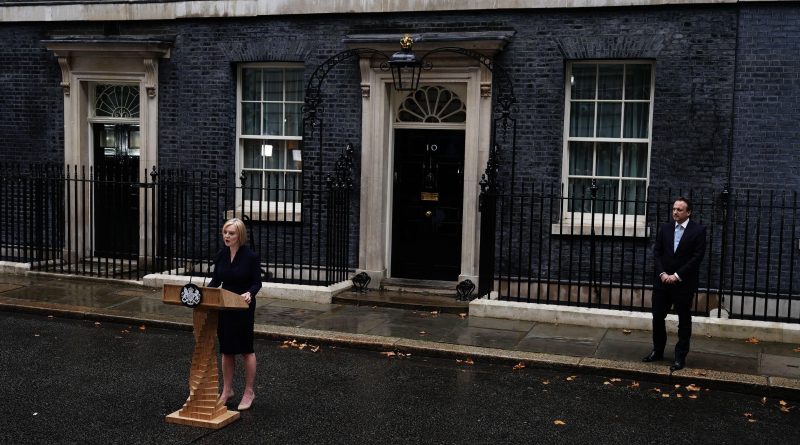Truss steps down after economic U-turns
By Connor Steel
LIZ TRUSS has announced she will step down as Prime Minister next week after just forty-five days in office as she gave a speech outside Number Ten this lunchtime (October 20); finally succumbing to huge pressure from Conservative MPs about her leadership following hugely damaging U-turns on economic growth policy.
It follows weeks of turbulence following the mini-budget and sacking of Kwasi Kwarteng with the Government making an U-turn on scrapping the 45p rate of income tax for higher earnings. Further U-turns were then set out by new Chancellor Jeremy Hunt on Monday in an urgent speech aimed at stabilising the finance market.
Another political blow came on Wednesday afternoon following the resignation of ex-Home Secretary Suella Braverman after admitting a ‘technical security breach’, whilst party confusion rose on the subject of whether Labour’s opposition day vote on fracking was actually a confidence vote in the Government. This resulted in allegations of physical ‘manhandling’ and ‘bullying’ of Conservative MPs in the lobby area during the division.
Up to fourteen MPs are reported to have submitted overnight letters of no-confidence in Liz Truss, who met with 1922 Committee Chairman Sir Graham Brady in Number Ten, whilst one disgruntled Conservative told media platforms her position was ‘untenable’ and the PM ‘had 12 hours to save her job’ earlier this morning.
Shortly afterwards Liz Truss’ resignation was confirmed with a ninety second statement from Downing Street that saw her admit she ‘could not deliver her mandate’ after recent events; informing the country that she will be staying in office until a new successor is appointed following another Conservative Party leadership race.
But she also pointed to Government successes such as capping energy bills and cutting the rate of National Insurance during the cost of living crisis, whilst her tenure will further be remembered for the death of Queen Elizabeth II. Her Majesty’s passing saw a period of National Mourning which ended after her State Funeral, Liz Truss giving tributes on behalf of the nation and also reading lines from scripture at Westminster Abbey.
It is reported that a new Prime Minister will be in place by October 28, which means Liz Truss is guaranteed to become the shortest serving UK leader in political history. Her now-scheduled fifty-three day tenure beats the previous record of George Canning, who served between April and August 1827 before he died in office.
A timetable for the leadership contest has also been outlined with a change of threshold for entering the race to succeed Ms Tuss; the support of 100 Conservatives required by 2pm on Monday. This will naturally limit the number of contenders and votes will be held until the top two is selected. It is unclear whether this will be narrowed down by MPs or party members to choose a winner, with a week’s deadline given for this process.
Popular names for the running include former Chancellor Rishi Sunak, current Leader of the House Penny Mordaunt, Defence Secretary Ben Wallace and Trade Secretary Kemi Badenoch. But there could still be a surprise return to frontline politics for Boris Johnson whilst Suella Braverman is believed to be having long discussions about whether to stand again, particularly so soon after quitting as Home Secretary yesterday.
Opposition party leaders have called for an immediate general election in the wake of Liz Truss’ exit with Sir Keir Starmer saying: ‘This is not just a soap opera at the top of the Tory party, it’s doing huge damage to the reputations of our country. We need a general election so the public can have their say on this utter chaos.’
The Liberal Democrats, Scottish National Party and the Green Party have also called for a national vote, but are unable to force any Government to trigger one under current laws. As it stands the next general election is scheduled for a latest date of January 2025 with polls predicting a Labour Party landslide victory similar to 1997, which saw Tony Blair win 418 seats in a 179-margin majority over Conservative leader Sir John Major.
Readers are encouraged to visit media sites such as BBC News, Sky News and ITV News for all developing updates or reaction to this story; which includes any announcements of potential new leadership contenders.
PICTURED BY ALAMY (2JWMGBP): Liz Truss addresses media and guests back in September after being appointed as Prime Minister, but her historical tenure was hampered by U-turns and financial policy issues.




